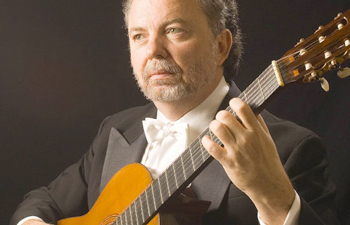by Mike Telin

On Saturday, April 16 at 7:30 pm at Plymouth Church, Manuel Barrueco will make his much-anticipated return to the Cleveland Classical Guitar Society stage with a program featuring works by Sylvius Leopold Weiss, J.S. Bach, Fernando Sor, Moreno Torroba, Joaquin Turina, and Isaac Albeniz.
We spoke to the engaging Manuel Barrueco by telephone and began by asking him to share his thoughts on his program.
Weiss’s Suite VII in d: “He was a lute player, and a contemporary of Bach. As far as I know that was the only instrument he wrote for. It’s lovely music, very melodic, but doesn’t have the complexity of Bach so it will make a nice introduction to the Chaconne.”
Bach’s Chaconne from Partita No. 2 in d: “It is a great masterpiece of the whole of music literature. I think I first learned this when I was 12. Of course I couldn’t really play it well at that time, much less understand it. But it’s been in my life for so long now that it feels like an old friend. Even though my views on it have changed through the years, I feel very close to it. I’ve come to the point that I know what I want to do with every note.”
Sor’s Variations on a theme by Mozart: “It will be a nice follow-up to the Bach. It’s much lighter. It really is a charming piece that works well on many different levels. It’s also one that the general public appreciates.”
The second half of the program is dedicated to Spanish music and will include Torroba’s Suite Castellana and Turina’s Fandanguillo, Soleares, and Rafaga. The program will conclude with Albeniz’s Mallorca and his “Cataluña” and “Seville” from Suite Española.
“I think it will be surprising to people that even though there are three Spanish composers in the second half who are all based in folkloric music, they are all very different. Torroba is more Castilian, while the pieces by Turina have a flamenco base from the south of Spain with Moorish influences. And the works by Albeniz — it’s like they’re from the earth. His music also describes different parts of Spain.
“I think it is a nice program with really well-known pieces, but it also has depth to it.”
Mike Telin: I watched a YouTube interview that you gave in Brazil during which you talked about having nurturing teachers and how important they were to you.
MB: I did. I loved the teachers that I had.
MT: You must have the same approach to teaching, because listening to you talk about your teachers was like listening to your students talk about you.
MB: Really! I don’t know what they say about me when I’m away. I’m not checking up on them. But I think it’s a privilege to be able to work with these young people who are so talented. That may sound like I’m just trying to be nice, but I really do mean it. When you’re working with this kind of talent you learn a lot.
And with them I get to talk about things that I rarely get to talk about. It’s good for me to be in contact with these young players. I remember someone — I think it may have been Casals — saying that one can begin to sound old, but hopefully by working with young people, they will slow that process down.
I see their energy, their enthusiasm, and the way that they view things. It’s nice to be able to talk to them about the way that I see things, and for them to bring me back to some of the idealism that they have. Teaching is a privilege and one of the nicest things one can possibly do.
MT: You’ve embraced a number of musical styles during your career. In addition to great classical artists, you’ve worked with the likes of Al Di Meola, Steve Morse, and Andy Summers. Have you always liked a variety of musical styles?
MB: There was a period of time when maybe I was a little bit of a snob, though I’ve always loved The Beatles. But honestly, the only reason I was able to play with a rock musician like Steve Morse or Al Di Meola was that we were able to find some common ground. I’m not a rock or jazz player and I don’t pretend to be. But what these guys have in common is that they’re all good and versatile musicians. All of Al’s music is written out, everything is there. When we gave concerts together we played Piazzolla. Steve Morse studied classical, and has a big knowledge of all music. So again it’s finding some common ground, even if it was outside of our comfort zone.
Working with them was also enriching because these guys have very different ways of looking at music. It’s a learning experience, and I feel that I have learned a lot from working with them: they look at music from a different perspective and the opportunity to sit next to these guys was amazing.
MT: In that same interview in Brazil, you said that the way you practice is always changing. That interview was from a few years back, so I’m wondering if that statement is still true.
MB: Yes it is. There are certain things that remain constant but I do find that the approach changes as the needs change. And hopefully one finds more efficient ways of practicing. In a funny way I enjoy practicing more now than I did before. I never thought this would happen. I’m a lot more disciplined now. It used to take me hours after getting out of bed to finally get going. And now, basically I’m not even out of bed and I’m in my room working.
Published on ClevelandClassical.com April 12, 2016.
Click here for a printable copy of this article



